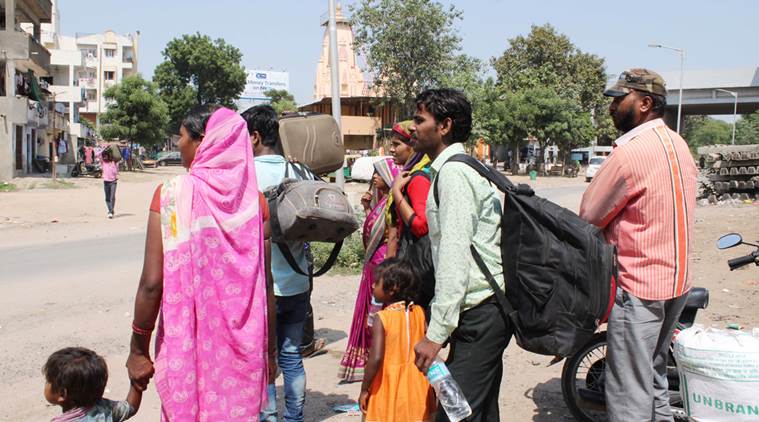THE 14-MONTH-OLD child picks up a small plastic drum with a whistle at the end and gives it to her grandmother, signalling with her hands to blow it. “She understands everything,” says the grandmother, sitting next to the child on a low wooden bunk bed, with a few plastic toys and a stuffed pink teddy bear on it.

On September 28, the child was allegedly abducted from her grandfather’s tea stall opposite a ceramic tiles factory in Sabarkantha district and raped by a migrant worker, leading to mobs targeting “non-Gujaratis” and triggering a mass exodus to Bihar, UP and MP.
The accused, a 19-year-old from Bihar, was arrested and lodged in Himmatnagar sub-jail. On Sunday, the Sabarkantha district bar association declared that no advocate will appear for him in the court. But all that is of little consolation for the child’s family, which is struggling to cope with the trauma of that day.
“Today, it is our daughter, tomorrow it could be anyone else’s. The accused should be hanged with a message for the country that one who commits such a heinous crime will face death,” says the child’s father.
Pointing to white marks under the child’s eyes, her uncle says, “These are from that day. She had black mud all over her face, in her mouth and nose. At first, when we saw her lying in the ditch in the fields near the stall, we thought she was dead. Her mouth, filled with mud, was wide open. But soon, my elder brother noticed her leg moving.”
On Friday, the toddler was discharged from the Ahmedabad civil hospital. “At times, though rarely, she cries if I am not around. Also, she would tell me earlier in her own way if she needed to relieve herself. Now she is not able to,” says her mother. “But otherwise, she is a very brave child. After going through that hell, she is trying to be a normal kid.”
The family, however, has been asked to take a number of precautions. “The doctors have advised us to keep her near a water cooler to keep the heat and sweat away so that her wounds heal. We had to borrow a cooler from a relative. The doctors have also asked us not to let her be with anyone other than close family, as she might catch an infection,” says the grandmother.
A room adjoining the kitchen and a verandah outside are all that the family of ten owns. The other portions built in a line adjoining their home are occupied by members of the extended family.
Recalling the events of that day, the mother says, “My mother had called me for help after she injured her hand and was not able to milk the cattle. I went there in the morning and was to return by evening. Before returning home, I was cooking at my father’s tea stall where I had halted. The next thing I remember was my child was missing from the cot near the stall. I lost consciousness and don’t know what happened after that.”
Meanwhile, the family says, the child’s uncle, an autorickshaw driver, had reached the stall to drop another sister and her two girls back home. “I saw this man sitting on the cot outside the stall and having some snacks,” he says.
“I put the child on the cot to light the lantern hanging from the roof. I asked this man to keep an eye on her. When I turned back, I saw both of them missing. Initially, I thought that the child might have pulled herself down from the cot and crawled down to the fields,” says the grandfather, who has been running the stall for the last eight years.
“I had noticed that the man sitting on the cot had white powder from the factory on his feet. So I went inside the factory to ask about him. But the owner told me that he has gone to the taluka. When I told him the reason, we searched for him in the factory, his quarters in the compound, but in vain,” says the child’s uncle.
It was then that he noticed the accused crossing the road from the fields near the stall. “I asked him to stop. When he turned back, I saw bloodstains on his clothes. It hit me that my niece may be no more. I pleaded with him to tell me where she was, I fell at his feet, but he kept saying that he did not know anything,” the uncle says.




